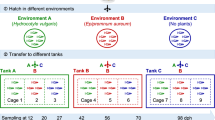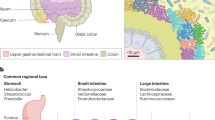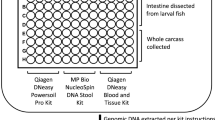Abstract
Zebrafish have a 50-year history as a model organism for studying vertebrate developmental biology and more recently have emerged as a powerful model system for studying vertebrate microbiome assembly, dynamics and function. In this Review, we discuss the strengths of the zebrafish model for both observational and manipulative microbiome studies, and we highlight some of the important insights gleaned from zebrafish gut microbiome research.
This is a preview of subscription content, access via your institution
Access options
Subscribe to this journal
We are sorry, but there is no personal subscription option available for your country.
Buy this article
- Purchase on Springer Link
- Instant access to full article PDF
Prices may be subject to local taxes which are calculated during checkout

Similar content being viewed by others
References
Grunwald, D. J. & Eisen, J. S. Headwaters of the zebrafish—emergence of a new model vertebrate. Nat. Rev. Genet. 3, 717–724 (2002).
Burns, A. R. & Guillemin, K. The scales of the zebrafish: host–microbiota interactions from proteins to populations. Curr. Opin. Microbiol. 38, 137–141 (2017).
Stephens, W. Z. et al. The composition of the zebrafish intestinal microbial community varies across development. ISME J. 10, 644–654 (2016).
Gaulke, C. A., Barton, C. L., Proffitt, S., Tanguay, R. L. & Sharpton, T. J. Triclosan exposure is associated with rapid restructuring of the microbiome in adult zebrafish. PLoS One 11, e0154632 (2016).
Hill, J. H., Franzosa, E. A., Huttenhower, C. & Guillemin, K. A conserved bacterial protein induces pancreatic beta cell expansion during zebrafish development. Elife 5, e20145 (2016).
Rolig, A. S. et al. A bacterial immunomodulatory protein with lipocalin-like domains facilitates host–bacteria mutualism in larval zebrafish. Elife 7, e37172 (2018).
Rawls, J. F., Samuel, B. S. & Gordon, J. I. Gnotobiotic zebrafish reveal evolutionarily conserved responses to the gut microbiota. Proc. Natl Acad. Sci. USA 101, 4596–4601 (2004).
Bates, J. M. et al. Distinct signals from the microbiota promote different aspects of zebrafish gut differentiation. Dev. Biol. 297, 374–386 (2006).
Melancon, E. et al. Best practices for germ-free derivation and gnotobiotic zebrafish husbandry. Methods Cell Biol. 138, 61–100 (2017).
Lewis, K. L., Del Cid, N. & Traver, D. Perspectives on antigen presenting cells in zebrafish. Dev. Comp. Immunol. 46, 63–73 (2014).
Stednitz, S. J. et al. Forebrain control of behaviorally driven social orienting in zebrafish. Curr. Biol. 28(2445-2451), e3 (2018).
Davis, D. J. et al. Lactobacillus plantarum attenuates anxiety-related behavior and protects against stress-induced dysbiosis in adult zebrafish. Sci. Rep. 6, 33726 (2016).
Borrelli, L. et al. Probiotic modulation of the microbiota-gut-brain axis and behaviour in zebrafish. Sci. Rep. 6, 30046 (2016).
Truong, L. et al. Multidimensional in vivo hazard assessment using zebrafish. Toxicol. Sci. 137, 212–233 (2014).
Phelps, D. et al. Microbial colonization is required for normal neurobehavioral development in zebrafish. Sci. Rep. 7, 11244 (2017).
Bates, J. M., Akerlund, J., Mittge, E. & Guillemin, K. Intestinal alkaline phosphatase detoxifies lipopolysaccharide and prevents inflammation in zebrafish in response to the gut microbiota. Cell Host Microbe 2, 371–382 (2007).
Cheesman, S. E., Neal, J. T., Mittge, E., Seredick, B. M. & Guillemin, K. Epithelial cell proliferation in the developing zebrafish intestine is regulated by the Wnt pathway and microbial signaling via Myd88. Proc. Natl Acad. Sci. USA 108, 4570–4577 (2011).
Troll, J. V. et al. Microbiota promote secretory cell determination in the intestinal epithelium by modulating host Notch signaling. Development 145, dev155317 (2018).
Murdoch, C. C. & Rawls, J. F. Commensal microbiota regulate vertebrate innate immunity—insights from the zebrafish. Front. Immunol. 10, 2100 (2019).
Ye, L. et al. High fat diet induces microbiota-dependent silencing of enteroendocrine cells. Elife 8, e48479 (2019).
Semova, I. et al. Microbiota regulate intestinal absorption and metabolism of fatty acids in the zebrafish. Cell Host Microbe 12, 277–288 (2012).
Davis, D. J., Bryda, E. C., Gillespie, C. H. & Ericsson, A. C. Microbial modulation of behavior and stress responses in zebrafish larvae. Behav. Brain Res. 311, 219–227 (2016).
Bosch, T. C. G., Guillemin, K. & McFall-Ngai, M. Evolutionary ‘experiments’ in symbiosis: the study of model animals provides insights into the mechanisms underlying the diversity of host-microbe interactions. Bioessays 41, e1800256 (2019).
Wiles, T. J. et al. Modernized tools for streamlined genetic manipulation and comparative study of wild and diverse proteobacterial lineages. mBio 9, e01877–18 (2018).
Taormina, M. J. et al. Investigating bacterial-animal symbioses with light sheet microscopy. Biol. Bull. 223, 7–20 (2012).
Jemielita, M. et al. Spatial and temporal features of the growth of a bacterial species colonizing the zebrafish gut. mBio 5, e01751–14 (2014).
Wiles, T. J. et al. Host gut motility promotes competitive exclusion within a model intestinal microbiota. PLoS Biol. 14, e1002517 (2016).
Schlomann, B. H., Wiles, T. J., Wall, E. S., Guillemin, K. & Parthasarathy, R. Sublethal antibiotics collapse gut bacterial populations by enhancing aggregation and expulsion. Proc. Natl Acad. Sci. USA 116, 21392–21400 (2019).
Wiles, T. J. et al. Swimming motility of a gut bacterial symbiont promotes resistance to intestinal expulsion and enhances inflammation. PLoS Biol. 18, e3000661 (2020).
Schlomann, B. H., Wiles, T. J., Wall, E. S., Guillemin, K. & Parthasarathy, R. Bacterial cohesion predicts spatial distribution in the larval zebrafish intestine. Biophys. J. 115, 2271–2277 (2018).
Stephens, W. Z. et al. Identification of population bottlenecks and colonization factors during assembly of bacterial communities within the zebrafish intestine. mBio 6, e01163–15 (2015).
Bae, S., Mueller, O., Wong, S., Rawls, J. F. & Valdivia, R. H. Genomic sequencing-based mutational enrichment analysis identifies motility genes in a genetically intractable gut microbe. Proc. Natl Acad. Sci. USA 113, 14127–14132 (2016).
Rawls, J. F., Mahowald, M. A., Ley, R. E. & Gordon, J. I. Reciprocal gut microbiota transplants from zebrafish and mice to germ-free recipients reveal host habitat selection. Cell 127, 423–433 (2006).
Burns, A. R. et al. Interhost dispersal alters microbiome assembly and can overwhelm host innate immunity in an experimental zebrafish model. Proc. Natl Acad. Sci. USA 114, 11181–11186 (2017).
Stagaman, K., Burns, A. R., Guillemin, K. & Bohannan, B. J. The role of adaptive immunity as an ecological filter on the gut microbiota in zebrafish. ISME J. 11, 1630–1639 (2017).
Roeselers, G. et al. Evidence for a core gut microbiota in the zebrafish. ISME J. 5, 1595–1608 (2011).
Spence, R., Gerlach, G., Lawrence, C. & Smith, C. The behaviour and ecology of the zebrafish, Danio rerio. Biol. Rev. Camb. Philos. Soc. 83, 13–34 (2008).
Wong, S. et al. Ontogenetic differences in dietary fat influence microbiota assembly in the zebrafish gut. mBio 6, e00687–15 (2015).
Givens, C., Ransom, B., Bano, N. & Hollibaugh, J. Comparison of the gut microbiomes of 12 bony fish and 3 shark species. Mar. Ecol. Prog. Ser. 518, 209–223 (2015).
Egerton, S., Culloty, S., Whooley, J., Stanton, C. & Ross, R. P. The gut microbiota of marine fish. Front. Microbiol. 9, 873 (2018).
Ding, Q. et al. The hepatotoxicity of palmitic acid in zebrafish involves the intestinal microbiota. J. Nutr. 148, 1217–1228 (2018).
Guo, X. et al. The growth-promoting effect of dietary nucleotides in fish is associated with an intestinal microbiota-mediated reduction in energy expenditure. J. Nutr. 147, 781–788 (2017).
Teame, T. et al. The use of zebrafish (Danio rerio) as biomedical models. Anim. Front. 9, 68–77 (2019).
Burns, A. R. et al. Contribution of neutral processes to the assembly of gut microbial communities in the zebrafish over host development. ISME J. 10, 655–664 (2016).
Brito, I. L. & Alm, E. J. Tracking strains in the microbiome: insights from metagenomics and models. Front. Microbiol. 7, 712 (2016).
Merrifield, D. L. et al. Ingestion of metal-nanoparticle contaminated food disrupts endogenous microbiota in zebrafish (Danio rerio). Environ. Pollut. 174, 157–163 (2013).
Catron, T. R. et al. Host developmental toxicity of BPA and BPA alternatives is inversely related to microbiota disruption in zebrafish. Toxicol. Sci. 167, 468–483 (2019).
Liu, Y. et al. Influence of endogenous and exogenous estrogenic endocrine on intestinal microbiota in zebrafish. PLoS One 11, e0163895 (2016).
Zang, L. et al. Dietary Lactobacillus plantarum ST-III alleviates the toxic effects of triclosan on zebrafish (Danio rerio) via gut microbiota modulation. Fish Shellfish Immunol. 84, 1157–1169 (2019).
Gaulke, C. A. et al. A longitudinal assessment of host-microbe-parasite interactions resolves the zebrafish gut microbiome’s link to Pseudocapillaria tomentosa infection and pathology. Microbiome 7, 10 (2019).
Paquette, C. E. et al. A retrospective study of the prevalence and classification of intestinal neoplasia in zebrafish (Danio rerio). Zebrafish 10, 228–236 (2013).
Burns, A. R. et al. Transmission of a common intestinal neoplasm in zebrafish by cohabitation. J. Fish Dis. 41, 569–579 (2018).
Rolig, A. S. et al. The enteric nervous system promotes intestinal health by constraining microbiota composition. PLoS Biol. 15, e2000689 (2017).
Ran, C. et al. Aeromonas veronii and aerolysin are important for the pathogenesis of motile aeromonad septicemia in cyprinid fish. Environ. Microbiol. 20, 3442–3456 (2018).
Acknowledgements
This work was supported in part by grants from the National Institutes of Health, under P01GM125576 to K.G., the National Institutes of Environmental Health Sciences (1R01ES030226) to T.J.S. K.S. was supported in part by the NIEHS Integrated Regional Training Program in Environmental Health Sciences grant (PI R.L. Tanguay, T32-ES007060-38).
Author information
Authors and Affiliations
Corresponding author
Ethics declarations
Competing interests
The authors declare no competing interests.
Additional information
Publisher’s note Springer Nature remains neutral with regard to jurisdictional claims in published maps and institutional affiliations.
Rights and permissions
About this article
Cite this article
Stagaman, K., Sharpton, T.J. & Guillemin, K. Zebrafish microbiome studies make waves. Lab Anim 49, 201–207 (2020). https://doi.org/10.1038/s41684-020-0573-6
Received:
Accepted:
Published:
Issue Date:
DOI: https://doi.org/10.1038/s41684-020-0573-6
This article is cited by
-
Anti-diarrheal drug loperamide induces dysbiosis in zebrafish microbiota via bacterial inhibition
Microbiome (2023)
-
Disentangling the link between zebrafish diet, gut microbiome succession, and Mycobacterium chelonae infection
Animal Microbiome (2023)
-
Challenges and opportunities in sharing microbiome data and analyses
Nature Microbiology (2023)
-
Zebrafish: an efficient vertebrate model for understanding role of gut microbiota
Molecular Medicine (2022)
-
Experimental methods modestly impact interpretation of the effect of environmental exposures on the larval zebrafish gut microbiome
Scientific Reports (2022)



